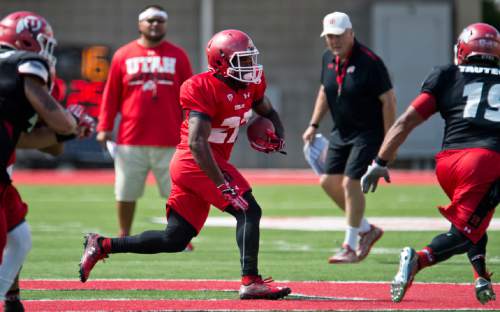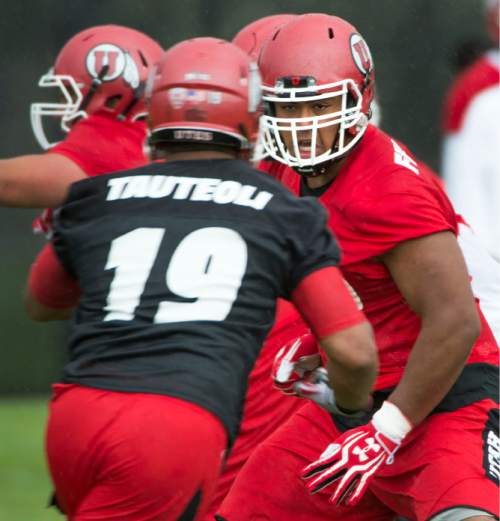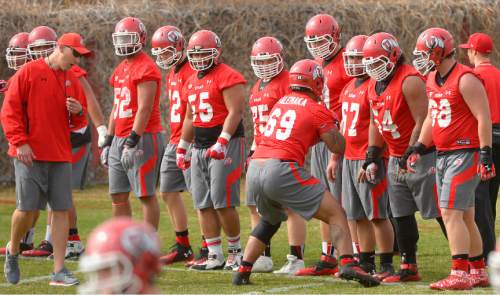This is an archived article that was published on sltrib.com in 2015, and information in the article may be outdated. It is provided only for personal research purposes and may not be reprinted.
When Utah football players argue that they missed class because they overslept or because they have a cold, they lose.
Marcel Brooks-Brown was shot and went to school the next day.
It's become one of his coaches' favorite lines, the freshman running back said, in the three months since he and sophomore offensive lineman Lo Falemaka were shot at a party on 1300 East, a block from Presidents Circle.
And it's true: Shot twice around midnight Sept. 13, Brooks-Brown walked out of the U. Hospital later that Sunday and into a classroom Monday.
Neither he nor Falemaka has played since. Brooks-Brown is redshirting, preserving his eligibility to play a full four years. Falemaka is recovering. But their ordeal may have factored into Utah's school-record six Pac-12 victories — having gathered teammates outside the hospital to consider the fragility of life on what had been a carefree Saturday night, and better framed the threat posed by the Oregon offense or the Washington defense.
To the wider world, Brooks-Brown hopes, that night's events will show that being a victim is not an indictment of an athlete's character. That assumption, he fears, is easy to make.
"Rarely do people get shot for no reason," Brooks-Brown said. "Especially here in Utah. But I'm here to say that I did not do anything wrong. The most that I did was I backed up a teammate if he needed help."
His account of events jibes with witness statements gathered by Salt Lake City police at the scene of what Brooks-Brown said was a party, unofficially, for Utah athletes.
When he arrived at the house, a female resident quizzed him at the door before admitting him: Who are you? What do you play? Who do you know?
He believes the three suspects got the third degree, too, and became unruly.
Brooks-Brown first noticed them while exiting the house shortly before midnight. The trio was arguing heatedly with Falemaka and the young woman, he said, and though he didn't know Falemaka well, he stood silently beside his teammate to even the numbers.
The suspects worried Brooks-Brown. Nobody knew who they were, he said. Despite being smaller than many of the party's guests, they said things like "We're down to bang with anyone in here." They projected confidence.
"Where I'm from, I know trouble when I see it," said Brooks-Brown, a Sacramento native. "I think Lo wasn't as ready for it as I was. ... I was hoping, like, 'This is Utah. Maybe it won't go like that.' But it ended up going like that."
The suspects eventually began to walk away, continuing to jaw with Falemaka as both he and Brooks-Brown followed, until one turned around, pulled out a handgun and fired without warning from about 4 feet away.
The first shot hit Falemaka in the stomach, dropping him instantly. Brooks-Brown was frozen as the man aimed the gun toward him, a second shot piercing his right side, below his ribs. After Brooks-Brown turned to run, a third bullet lodged in his lower back.
While the suspects fled, Brooks-Brown — still on his feet — sought help. He was later told that some party guests, having never before heard gunshots, assumed the sounds were firecrackers popping. He waited about 20 minutes for an ambulance, he said. One young woman gave him her shirt to stanch the bleeding in his side and told him to focus on breathing. Party guests made him lie down, and that's when the pain set in. His feet became cold and numb. He started to shake.
It was a struggle to stay awake. The wound in his back wasn't discovered until paramedics arrived, he said, and he had lost a lot of blood.
After arriving at the U. Hospital, he told doctors, "Be real with me. Am I going to be OK?"
It would be about an hour before they could give him a firm answer: The bullet in his side passed through without hitting anything vital, and the other had wedged "in between everything," more trouble to retrieve than to leave be.
"They said I got very, very lucky," said Brooks-Brown, a dark, dime-width bump hinting at the bullet that still resides in his lower back.
His next question, he said: What about Lo?
"They were like, 'We still don't know yet,' " he said. "So that was scary."
Meanwhile, teammates arrived from across the valley, congregating on the benches in front of the hospital to await word.
Junior left guard Isaac Asiata had been in Spanish Fork with his girlfriend when he learned about the shootings through a flurry of text messages.
By the time they arrived, he said, "damn near half the team was up here."
Many stayed until 4 a.m. or later. Asiata and his girlfriend didn't leave until 6 or 7 a.m., he estimates.
The first coach to visit Brooks-Brown was co-offensive coordinator Jim Harding, who recruited him while he rushed for 70 touchdowns at Rio Linda High. Harding was distraught, Brooks-Brown said, feeling he'd betrayed the trust of the running back's family when he promised nothing like this would happen to him in Salt Lake City.
Indeed, back home in Sacramento, Brooks-Brown said the popular reaction was: In Utah? Really?
"But it's not his fault," Brooks-Brown said. "I'm going to go out and enjoy college and have fun. That just happened to happen."
Teammates smile when asked about Brooks-Brown. Not only did he go to class that Monday, but he also asked coaches if he could return to practice later that week (no) and continued to attend team meetings.
"That kid, I feel like he lives for the grind," Asiata said. "Seeing him in person, his attitude, it's like you'd never think that happened to him."
Coaches told him that he ran with more power than he had before he was shot. He worked out relentlessly, he said, gaining back the 10 to 12 pounds he'd lost. He studied harder, said running backs coach Dennis Erickson.
"He knows he's had something given to him," Erickson said, "and he's got to take advantage of it."
Brooks-Brown's good fortune would be thrown into sharp relief two months later, when childhood friends Jaulon Clavo and Malik Johnson were shot after getting food before a team meeting at Sacramento's Grant High — the former high school of current Utes Devontae Booker and Darrin Paulo, as well as student assistant coach Paris Warren.
Their only fault, Brooks-Brown said: hailing from Del Paso Heights, and not the Manors. Associating with people involved in violence between the warring neighborhoods can be enough, Brooks-Brown said, to become a target. Clavo, 17, was hit in the neck and killed.
Falemaka, who did not respond to a request to be interviewed for this story, has been unable to practice but is no stranger at Utah's facility. Asiata said the timing was a shame, given that Falemaka played well as his backup during spring and fall practices.
He has a cheerful disposition, said junior center and close friend Hiva Lutui, who couldn't resist trying to make Falemaka laugh, even when there was "a little pain behind it" because of the staples in his stomach.
The three male suspects have not been apprehended. All were thought to be in their 20s. One was white, heavyset, with a beard, and the others were black, wearing red shirts and baseball caps — one 6-foot, with a red bandanna under his cap, the other 5-foot-9, with short dreadlocks. Anyone with information is asked to call SLCPD at 801-799-3000.
Brooks-Brown said he believes they're from California, based on their comments during the argument. Police are unsure. Falemaka has been "somewhat indifferent to the incident," said SLCPD detective Greg Wilking, though "that doesn't mean that he is guilty of anything or knows these people."
Brooks-Brown said he no longer lets it bother him that the trio is free. He thanks God that he's alive, and believes God will deal with the three men later. He's thankful for the young woman who gave him her shirt and told him to breathe. She later wrote him a get-well letter.
And he's grateful, he said with a broad smile, that when he's on the field next season, he'll have a story to tell.
Utah shooting victims
Freshman RB Marcel Brooks-Brown • Was the Sacramento Bee's Division II Offensive Player of the Year in 2013, rushing for 2,031 yards and 26 touchdowns as a junior, and followed that with 1,972 yards and 29 touchdowns as a senior. All told, rushed for 5,457 yards and 70 touchdowns as a prep. As a sophomore, he once scored six touchdowns in a single playoff game, including a 99-yard kickoff return. Is the son of Karen Brooks and was mentored in the Sacramento area by former Utah running back Marty Johnson.
Sophomore OL Lo Falemaka • Lettered three years at Cottonwood High, helping win the 2010 Region 2 championship. Has twice been the victim of a violent crime: In high school, was assaulted by three men while searching for a restroom before halftime of Cottonwood's game against Skyline. The assailants injured his face and knee. Was a backup to junior Isaac Asiata last year, when Asiata was right guard, and this year, when Asiata moved to left guard. Full name is Haile Falemaka, but goes by Lo, and is one of eight children.







